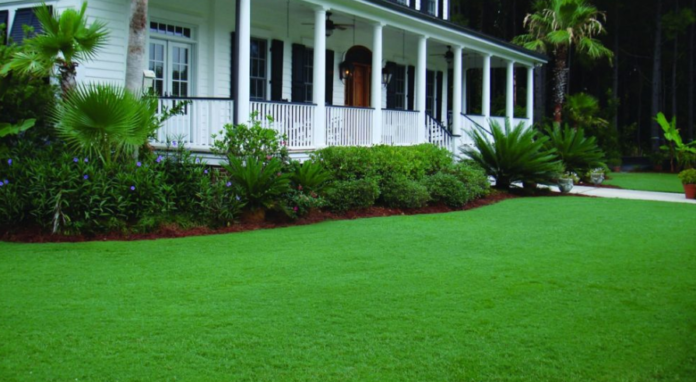When creating a lush, green lawn, choosing the right type of grass is crucial. Bermuda grass vs. sod is the point of this article because many individuals advocate that seeding the lawn will provide more benefits than sodding. But you will find that applying Bermuda sod grass will be a better choice after reading the arguments mentioned in the points below.
H2- Choosing Between Bermuda Grass Seed vs. Sod
When deciding between Bermuda grass seed and sod, homeowners must consider their budget, time constraints, desired lawn aesthetics, and the pros and cons of seeding and sodding. Bermuda grass seed is more budget-friendly but takes months for full results, while sod provides an instant green lawn. This article will compare Bermuda grass seed and sod grass to help you decide and determine which option best suits your needs.
H3- Describing Bermuda Sod Grass
Bermuda sod grass, or turf grass, is a fully-grown grass cultivated and harvested from a specialized farm. It comes as pre-grown rolls or squares and can be installed directly onto your lawn. Like other warm-season grasses, including Zeon Zoysia, this grass is known for its lush green appearance and ability to withstand high temperatures. It thrives in full sunlight and has a deep root system that helps it tolerate drought conditions. Bermuda provides an instant lawn due to its resilience and rapid growth and is often used to establish green spaces in residential and commercial areas like lawns, sports fields, and golf courses.
H4- Drawbacks of Planting Bermuda Grass Seed
Planting Bermuda grass seed has drawbacks, including slow germination, weed competition, inconsistent growth, maintenance demands, climate sensitivity, and challenges in establishing steep slopes or high-traffic areas.
Bermuda grass seed takes time to germinate and establish, requiring patience before achieving a fully grown lawn.
During germination, weeds can compete with young Bermuda grass seedlings, leading to patchy growth.
Bermuda grass seed may grow unevenly, unlike the Centipede grass sod, resulting in an uneven lawn appearance.
Initial care and regular watering are essential for successful seed establishment, demanding extra effort and attention.
The germination process can be sensitive to weather conditions, hindering growth in adverse climates.
Steep slopes or heavy foot traffic areas might challenge Bermuda grass seed establishment.
H5- Benefits of Establishing Centipede Sod Grass
Establishing centipede sod grass is a practical choice for homeowners seeking a low-maintenance, drought-tolerant, and visually appealing lawn that thrives in various conditions.
Rapid Establishment
Centipede sod quickly establishes a dense and attractive lawn, providing instant results.
Low Maintenance
It requires minimal maintenance compared to other grass varieties, saving time and effort. This sod grass you can order from suppliers like Atlanta Sod Farms only requires weekly watering, mowing, and annual fertilization.
Drought Tolerance
Centipede grass exhibits excellent drought tolerance, reducing the need for frequent watering.
Shade Tolerance
It thrives in partially shaded areas, making it ideal for yards with trees or buildings.
Insect Resistance
Centipede grass naturally resists common lawn pests, minimizing the need for chemical treatments.
Soil Erosion Control
Its dense growth helps prevent soil erosion on slopes and embankments.
Weed Suppression
Once established, centipede grass or Zeon Zoysia sod forms a dense carpet, suppressing weed growth.
Heat Tolerance
It thrives in warm climates and can withstand high temperatures.
H6- Factors to Consider Before Choosing
When deciding between seeds and sod grass, consider these factors like climate, budget, time, aesthetics, and lawn size.
Seeds require time for germination and establishment, while Emerald Zoysia sod grass provides an instant lawn.
Seeding is more budget-friendly, while sod installation can be costlier.
Sowing and caring for seeds demand more effort, whereas sod requires less labor.
Consider the grass type best suited to your region’s climate.
Sod offers immediate beauty, while seeds allow customization and variety.
Seeds need patience for a lush lawn, while sod provides instant gratification.
Sod grass requires less maintenance than seeding.
In conclusion, choosing Bermuda grass seed vs. sod grass depends on individual preferences and priorities. But homeowners should understand that Bermuda seeding can be time-consuming, the aesthetic results are uneven, and pre and post-installation require high-level maintenance. Whereas sod grass establishes quickly, the lawn will look even and attractive.
Here are three questions to provide additional information about Bermuda grass seed and sod grass.
H7- Frequently Asked Questions
Is Bermuda a good sod?
This is a good choice for homeowners seeking a resilient and visually appealing lawn. Its rapid growth, drought tolerance, and overall durability make it a popular option for many.
Where does Bermuda grass grow best?
Bermuda grass grows best in warm climates with full sunlight. It thrives in regions with hot summers and mild winters, making it ideal for southern and southwestern parts of the United States.
Is Bermuda seed easy to grow?
Bermuda seed is not always easy to grow. It requires proper soil preparation, consistent watering, and patience for germination and establishment, making it more challenging than sod installation.
Read article more ibommanews












